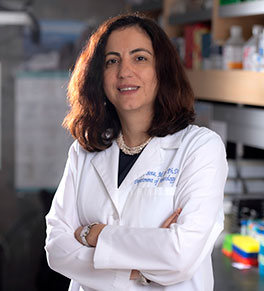Revving up clinical research

UCI Health has been able to fast-track COVID-19 clinical trials thanks to groundwork laid by the UCI Center for Clinical Research, says Daniela Bota, MD, PhD, the UCI School of Medicine's vice dean for clinical research. Photo by Steve Zylius / UCI
When the novel coronavirus became a worldwide crisis in early March, UCI Health clinicians were poised to fast-track possible treatments to tame the deadly virus that causes COVID-19.
That was possible because the UCI Center for Clinical Research opened in the summer of 2019 after three years of planning. The center's opening marked a new era in efforts to expand access to breakthrough therapies at UCI Health by accelerating the launch of clinical trials that seek to prevent, detect and treat diseases.
"This was extremely timely," says Daniela Bota, MD, PhD, vice dean of clinical research and medical director of the center, which now has 75 principle investigators and 120 clinical researchers on staff. "When COVID-19 hit, we had some advantages."
By March 23, a little more than two weeks after the World Health Organization (WHO) declared coronavirus a pandemic, UCI Health became one of the first U.S. sites to conduct a clinical trial of remdesivir, an experimental anti-viral drug, as a potential therapy for COVID-19.
Seven weeks later, UCI Health opened a second COVID-19 clinical trial, this one to determine the effectiveness of the drug aviptadil to treat critically ill patients suffering from acute respiratory distress syndrome, a primary cause of coronavirus-induced death. The drug has a long history of safe use in humans for lung ailments.
Fast-tracking clinical trials
Since then, Bota says, UCI Health has initiated four more clinical trials to fight different aspects of the disease caused by the novel coronavirus, officially named SARS-CoV-2.
- One involves developing an inhaler that would keep patients off ventilators.
- Another examines ways to prevent UCI Health workers from getting sick.
- Yet another study is assessing the efficacy of treating severely ill COVID-19 patients by infusing them with convalescent plasma, the liquid part of blood collected from patients who have recovered from the virus.
"There are more [coronavirus] clinical trials on the way," says Bota, adding that nondisclosure agreements do not permit her to elaborate. In one, she says, a local company is working to come up with a vaccine.
Most clinical trials at research hospitals, she says, can take up to nine months to launch. But because of the groundwork established by UCI Health with the opening of the Center for Clinical Research, Bota says that time has been slashed to three months or less.
"The idea was for us to facilitate clinical trials," says Bota, a neuro-oncologist recognized for her groundbreaking research on treatments for glioblastoma, the most aggressive form of brain cancer. "At other universities, they’ll have one study here, one study there, but no central office and no ability to accelerate the process."
A 'well-oiled system'
By the onset of the pandemic, the Center for Clinical Research had remedied that at UCI Health. "We had this structure, and we had established relations with the majority of big pharmaceutical companies," Bota says. "Second, we had a single point of contact. And third, we had a well-oiled system in which studies were already staffed and defined."
All noncancer clinical trials at UCI Health go through the center and involve multiple physicians with different clinical interests. For example, the principal investigators on the remdesivir trial are Dr. Alpesh N. Amin, a hospitalist and chair of the Department of Medicine, and infectious disease specialist Dr. Lanny Hsieh. Pulmonologist Dr. Richard Lee and Amin are leading the aviptadil trial.
Dr. Donald Forthal, chief of the Division of Infectious Diseases, and Dr. Minh-Ha Tran, an expert in transfusion medicine, are leading the study of convalescent plasma, the liquid substance from blood containing antibodies to the virus. It is seen as a possible treatment until a vaccine is developed, Bota says.
Convalescent plasma may confer "passive immunity," Bota notes, and potentially shorten the time a critically ill COVID-19 patient needs breathing assistance from a ventilator.
Although the pandemic has put a focus on its COVID-19 research, UCI Health has a broad array of clinical trials underway.
A 'wide portfolio'
The clinical research center currently oversees some 300 industry-funded interventional clinical trials — those with patients receiving experimental treatments.
They are being conducted across 12 School of Medicine departments, including dermatology, neurology, obstetrics and gynecology, ophthalmology and urology. An equal number of research studies are also in progress that do not yet involve patients.
"Our portfolio is very wide," Bota says. "Much of our work lies in developing novel, leading-edge cellular and genetic engineering therapies for life-threatening diseases."
She’s quick to credit a critical component of clinical trials: the people who opt to join them.
"Many patients come to UCI because of our clinical trials," Bota says. "They are extremely generous and want to participate in them. Many have publicly said how much potential hope we’re bringing everybody because they have direct access to what we offer."




